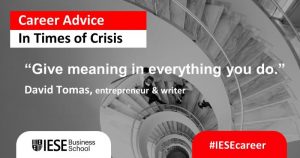During the last session of our series “Career Advice in Times of Crisis”, David Tomas, co-founder and CEO of the digital marketing agency Cyberclick shared his own experience on how happiness is key to achieving goals.
David shared his views as a CEO of a company and how he learned the importance of creating a work environment where employees are happy. While listening to him, I was feeling optimistic about the future. We have all dreamt of working in a place that fosters motivation, makes us feel good, and allows us to excel. We have all heard about the “Great Places to Work” rankings. This means the change is happening, firms are working on creating better workplace culture for their employees. The Covid-19 crisis is likely to boost this change.
We have seen this shift also in the “ Statement of the Purpose of a Corporation” issued last year where top CEOs go beyond shareholders profit and start thinking about benefits for other stakeholders, among which employees. For more on this topic, read this interesting article: https://hbr.org/2019/08/181-top-ceos-have-realized-companies-need-a-purpose-beyond-profit.
In addition, the newer working generation is more driven by encountering fulfillment at work than ever before. We speak more and more about purpose instead of money, having a great team instead of only a great boss. There is a growing need of flexibility on such items as time, workplace and career.
I like to think about the trends on the work market so I can adapt and better help students find the right opportunities. Back to the conversation with David, I think it is interesting to draw an analogy between company needs and candidates point of views. The actions companies take to attract, recruit and retain talent (set company culture, find the right set of skills to achieve results, ask for referrals and sell themselves) are mirrored in the way you should tackle job search (understand what type of companies culture you fit in, identify the sets of skills you offer, get recommendations in your network to push forward your application, work on your personal branding). Understanding the company’s needs helps better prepare for application and interview. It also allows you to make better choices amidst different career options.
In this article, I would like to dig into two key elements highlighted by David from a career management point of view: work values and skills. They are crucial for you to speak impactfully about yourself and your goals, this applies all the time but is all the more important in times of crisis. They are also the ones that will help you find fulfillment on the long run.

Find an environment and a team you trust!
As recommended by David, I have read the Netflix document “Freedom and Responsibility culture”. I was interested by this sentence:
“It’s easy to write admirable values; it’s harder to live them. […] We want everyone to help each other live the values and hold each other responsible for being role models. It is a continuous aspirational stretch.”
I was also captivated by the flexibility to take your holidays whenever you want, there is no limit.
David Tomas epitomizes those managers who implement what their company culture states. One thing is to communicate on it, another is to make it real. He believes matching employees’ needs with the company culture is key to business growth.
As a career coach, work values are one of the first elements I ask people to identify so as to set career goals. It helps you grasp the idea of what type of work environment is yours. It must seem obvious but in the end, we tend to forget this element when we go through a recruitment process, we forget to ask the recruiters (or our network): “how it is to work in your company? What does your daily work life look like? What do you enjoy the most in your company? What do you think is important in your company? What type of connections do you have with your peers?” These questions are fundamental to know if the values marketed by the company are really applied. I recommend doing a reality check with people that have worked in the company you are targeting. Before accepting the job, make sure you have had an interview with your manager, or at least with a colleague. All in all, you will work with people, you will interact with them, they are the ones who make the company values & culture a respected and implemented reality.
Culture, values and working habits are mainly owned and implemented by CEOs. If you want to make changes within your organization, you can always try if you have a manager that is willing to support it, otherwise David recommends finding a company where the culture suits you better.
According to Hubspot:
“Culture doesn’t just help to attract amazing people, it amplifies their abilities and helps them do their best work.”
Some interrogations were raised regarding management inside a company of highly flexible culture. How to ensure that people will commit to their tasks? How can the recruiter evaluate the candidate ability of taking ownership? David answers: “The company needs to create a trust relation with its employees”.
Trust is questioned when managers do not respect the values they communicate on and when employees do not perform a task they committed to. To create trust, companies need to be consistent and make their culture a reality, while employees need to demonstrate they have the right set of skills and motivation to achieve the results the business need.
Look for the genius in yourself
A challenge that companies are facing is to find talents with the right sets of skills that fit into the company values. Skills are the other important element of the combination. What are your skills? What do you bring on the table? What are those skills you really enjoy using?
It has to be a win-win recruitment process. It is not only about you or the company selling to each other, it is really about finding a fit between the two.
As David mentioned, check if you are an A player. Managers are looking for people with specific sets of skills to achieve a certain mission. Go for jobs where you can deliver, where you will excel thanks to those specific skills. This will be the way you will build trust. However, make sure you find the right balance, you need to face new challenges to keep your motivation and energy up. Accepting a job where your skills make it too easy to complete the missions will inevitably lead to boredom, and consequently loss of motivation. On the opposite, taking a position where the challenge is obviously beyond your abilities will create excessive stress, frustration and anxiety. In both cases, it will be impossible to reach happiness at work.
For career changers, remember that a set of skills can be used in different jobs. It is all about understanding the notion of transferable skills and convincing the interviewer that you have what it takes to complete the mission. From the manager’s point of view, a first step towards trust is reached when the candidates shows curiosity and learning agility to do the task assigned.
The importance of being happy
David talked about the Monday morning metaphor to stress the importance of using your energy on tasks you enjoy, in a work environment that suits your needs. “It is a virtuous circle”: being happy to achieve results, building self-confidence, gain trusting and feeling good about it to transmit happiness to other.
Making people feel happy at work is key to keep them engaged. The environment is set by the company culture, but the employees also share their part of responsibility in reaching this “happiness” at work. They do so through personal growth and professional achievements, which can be attained by ensuring your values and skills fit the company culture and the mission challenges. Make sure you understand them to be fulfilled and succeed in your career.
David suggested 3 tips for managers to make their business successful: “Listen to your team | Seek the genius in every person | Give meaning in everything you do.”
Following the flow of the analogy, I would like to end this comparison with 3 tips to manage your career successfully: “Find an environment and team you trust | Look for the genius in yourself | Give meaning in everything you do.”
Thank you David for taking time to share your experience and insights to the IESE population as co-founder and CEO. David is also the author of two books: The Happiest Company in the World & A Millennial’s Diary.
Thank you Pilar Lasheras for always being present to make all these happen. Thank you to Pilar Fernandez who introduced us to David and wrote an interesting article on her experience.
[This article was first posted on Linkedin]
Pursue your dream MBA! Take these next steps today:







